Acu-Loc 2 Wrist Plating System
The Acumed Acu-Loc 2 Plating System is a next-generation solution in plating fixation that focuses on complete implant options and a streamlined surgical process.
This comprehensive system includes several plate families to give surgeons the freedom to choose between distal or proximal sitting plates, three different plate extension options and fragment specific plating options.
The system also includes instrumentation for plate placement and fracture management.
For in-depth information, documentation, key publications and specifications, head to the Acumed website here.
To chat with one of our team, or ask us a question, please get in touch. Call us on 0800 333 909 or email admin@orthomedics.co.nz.
Acu-Loc 2 Wrist Plating System with 2.7 mm Low-Profile Hexalobe Screws Overview
The Acumed Acu-Loc 2 Plating System is a next-generation solution in plating fixation that focuses on complete implant options and a streamlined surgical process.
This comprehensive system includes several plate families, offering surgeons the freedom to choose between distal or proximal sitting plates, three different plate extension options, and fragment-specific plating options.
The addition of 2.7 mm Low-Profile screws provides more options for proximal shaft screws to accommodate varying patient anatomy.
Features
-
Comprehensive Plating System
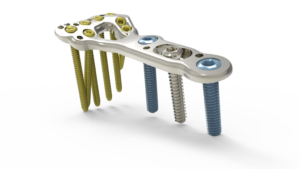
Standard, Variable Angle Locking, Fragment Specific and Extension Plates address a variety of fracture patterns
-
Frag Loc® Technology
A patented, two-part cannulated compression screw is designed to compress dorsal fragments
-
Modular Extension Plate Attachments
Offer surgeons the option to extend any of the long and wide Volar Distal Radius Proximal Plates up to 176 mm.
-
Fracture Support
The distal screw row is designed for subchondral support, while the two styloid screws target the radial column. The ulnar corner of the plate offers suture holes for addressing small volar fragments
-
Instrumentation
Innovative instrumentation includes a targeting guide with radiopaque markings that allow visualization of anticipated screw trajectories. Kickstand posts are offered for distal first reduction and corrective osteotomy procedures
Distal Radius Fragment Specific (DRFS) Plates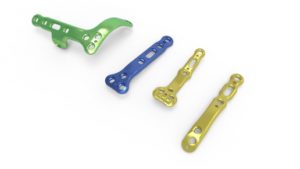
Acumed Distal Radius Fragment Specific (DRFS) Plates are designed to independently address the fractures of the intermediate and radial columns. The modular nature of the plates, which include the Dorsal Rim Buttress Plate, Dorsal Lunate Plate, Volar Lunate Suture Plate, and Divergent Radial Styloid Plate, allows compression of fracture fragments from multiple directions.
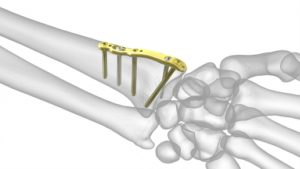 The Divergent Radial Styloid Plate buttresses the radial column. Targeted distal screw placement is designed to provide subchondral bone support, with one screw targeting the dorsal rim of the sigmoid notch and the other targeting the volar rim. In addition, fixed-angle screw trajectories are designed to avoid the sigmoid fossa, minimizing penetration of the distal radioulnar joint.
The Divergent Radial Styloid Plate buttresses the radial column. Targeted distal screw placement is designed to provide subchondral bone support, with one screw targeting the dorsal rim of the sigmoid notch and the other targeting the volar rim. In addition, fixed-angle screw trajectories are designed to avoid the sigmoid fossa, minimizing penetration of the distal radioulnar joint.
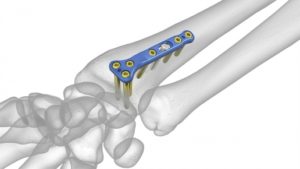 The Dorsal Lunate Plate is designed to provide support to fracture patterns that involve the dorsal lunate facet of the distal radius and the sigmoid notch. The Dorsal Lunate Plate can be inserted through a smaller incision than a standard dorsal approach. For added stability, three plate screws are designed to target the subchondral bone and support the lunate facet.
The Dorsal Lunate Plate is designed to provide support to fracture patterns that involve the dorsal lunate facet of the distal radius and the sigmoid notch. The Dorsal Lunate Plate can be inserted through a smaller incision than a standard dorsal approach. For added stability, three plate screws are designed to target the subchondral bone and support the lunate facet.
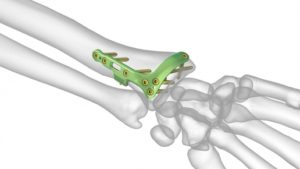 The Dorsal Rim Buttress Plate, designed for distal radius fractures, is positioned on the dorsal ulnar side of the radius. The plate extends radially to support dorsal lip comminution and buttress dorsal fragments. Three screws are designed to target the subchondral bone and support the lunate facet, while a screw can be inserted ulnar-to-radial for further radial styloid support.
The Dorsal Rim Buttress Plate, designed for distal radius fractures, is positioned on the dorsal ulnar side of the radius. The plate extends radially to support dorsal lip comminution and buttress dorsal fragments. Three screws are designed to target the subchondral bone and support the lunate facet, while a screw can be inserted ulnar-to-radial for further radial styloid support.
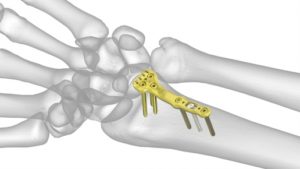 The Volar Lunate Suture Plate supports the volar ulnar corner of the distal radius. Built-in suture holes allow for sutures to be used with the plate to capture small articular fragments. Distal plate placement may maximize volar ulnar lip support, while three screws target the subchondral bone to support the lunate facet.
The Volar Lunate Suture Plate supports the volar ulnar corner of the distal radius. Built-in suture holes allow for sutures to be used with the plate to capture small articular fragments. Distal plate placement may maximize volar ulnar lip support, while three screws target the subchondral bone to support the lunate facet.
Standard Volar Distal Radius Plates
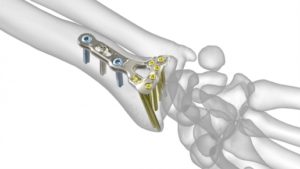
Acumed Acu-Loc 2 Standard Volar Distal Radius Plates have an optimized design to closely replicate the anatomical contours of the distal radius and assist in restoring its natural geometry.
Other optimized features include a lower profile, polished finish which may help minimize soft tissue irritation, and converging ulnar screws, additional suture holes, and added K-wire holes for provisional fixation.
Proximal Volar Distal Radius (VDR) Plates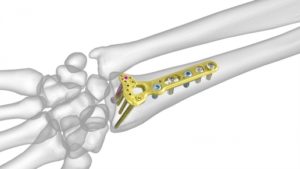
The Acumed Acu-Loc 2 Proximal Volar Distal Radius (VDR) Plates are designed for distal radius fracture and osteotomies, as well as segmented diaphyseal fractures. Customizable plate length and width options allow for sizing of varying patient anatomies.
In addition, converging ulnar screws, suture holes, and K-wire holes have been incorporated to support the volar ulnar lip and lunate facet. The 2.3 mm Variable Angle screws can also be used with this plate family.
Extension Plates
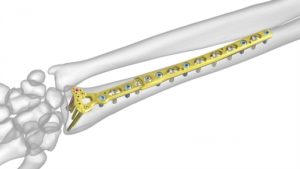
Acumed Acu-Loc 2 Extension Plates are designed to lock to Acu-Loc 2 Proximal VDR Plates to provide rigid fixation of segmental fractures of the distal radius that extend into the diaphyseal region. The proximal plate end is tapered and the undersurface is designed for limited contact with the bone.
Frag-Loc Compression Screw
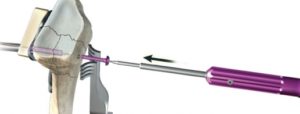
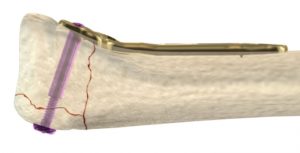
The Frag-Loc Compression Screw is a two-part cannulated compression screw for dorsal comminution that gives surgeons the option for steadfast dorsal compression through a small dorsal incision. In addition, the undersurface geometry of the screw head allows for sub-osseous purchase into the dorsal fragment while designed for minimizing hardware prominence.
Variable Angle Locking Screws
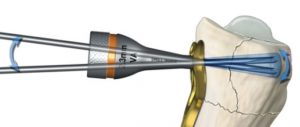
Acumed Variable Angle Locking Screws can aid in the capture of specific fragments or accommodate variations in patient anatomy. They can be used in any distal hole of any of the gold colored Acu-Loc 2 Proximal VDR Plates or Acu-Loc Extra Articular Plates. The screws allow for a total variance of 5 mm or 15 degrees.
2.7 mm Low-Profile Hexalobe Screws
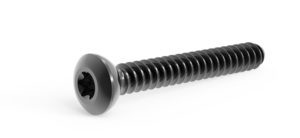
Single Drill for Surgical Efficiency: When plating the distal radius and ulna, the 2.7 mm Low-Profile Hexalobe Screw and the 2.3 mm screws that are used for fixation both use the 2.0 mm Quick-Release Drill.
Reduced insertion torque for easier advancement: 2.7 mm Low-Profile Hexalobe Screws have a 58.5% reduction in insertion torque compared to 2.7 mm Hexalobe Screws.*
Tailored to your patient’s needs: A smaller diameter screw is designed to address fractures in smaller bones or smaller-stature patients.
*Data on file with Acumed
